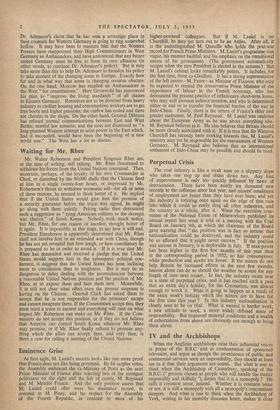Eminence Grise
At first sight, M. Laniel's success looks like one more proof that France does not like being governed. By 84 surplus votes, the Assembly embraced the ex-Minister of Posts as the next Prime Minister of France after rejecting' two of the strongest politicians on the right and the left of centre, M. Reynaud and M. Mendes France. And the only positive assets that M. Laniel could offer were his resistance record, in contrast to M. Pinay, and his respect for the Assembly of the Fourth Republic, in contrast to most of his higher-powered colleagues. But if M. Laniel is no Churchill, he may yet turn out to be an Attlee. After all, it is the undistinguished M. Queuille who holds the post-war record for French Prime Ministers. M. Laniel's programme was vague, his manner bashful, and his emphasis on the transitional nature of his government. (The government automatically resigns when the new President is elected in the autumn.) But M. Laniel's cabinet looks remarkably potent. It includes, for the first time, three ex-Gaullists. It has a strong representative of the left centre—M. Faure—as Minister of Finance, who may be expected to remind the conservative Prime Minister of the importance of labour in the French economy, who has denounced the present practice of inflationary short-term loans, who may well increase indirect taxation, and who is determined either to end or to transfer the financial burden of the war in Indo-China. Finally, there is the return of France's elder and greater statesman, M. Paul Reynaud. M. Laniel was cautious about the European Army as he was about everything else. M. Reynaud believes in it. He also believes that Britain should be more closely associated with it. If it is true that Sir Winston Churchill has recently been working towards this, M. Laniel's ministry may yet be responsible for the rearmament of Western Germany. M. Reynaud also believes that an international settlement of Indo-China may be possible and should be tried.


























































 Previous page
Previous page